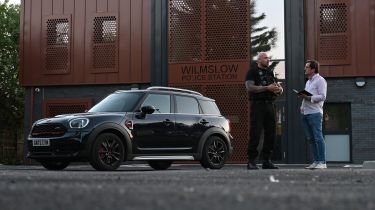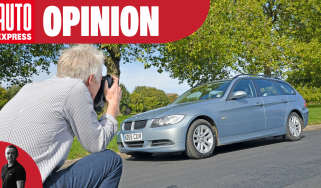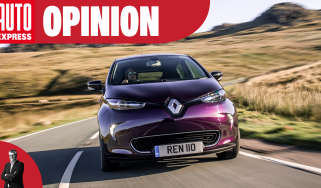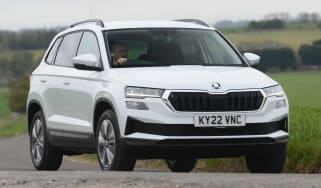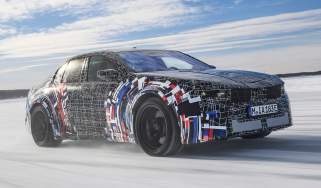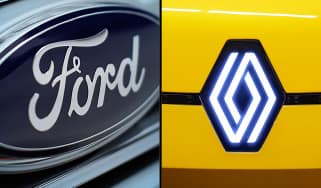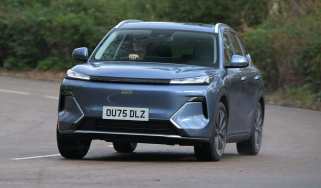Illegal car meets and the police battle against anti-social driving
Anti-social driving is an ongoing issue, so we spent the day with Cheshire Constabulary to find out how they're tackling it
If you’re a petrolhead, chances are you’ve attended a car meet at least once, whether that be a large ticketed event or simply a catch-up with a couple of friends in a McDonald’s car park.
Yet, while most of these gatherings are well intentioned, the police are now struggling to curb a growing number of ‘illegal car meets’ that are cropping up all over the place and part of a wider issue: ‘anti-social driving’.
With both terms being as broad and ambiguous in equal measures as each other, we strapped ourselves in for a patrol with Cheshire Constabulary's Road and Crime unit to get to the bottom of what exactly this means and how profound a problem the police are facing.
Our companion for the night was PC Mark Jones – a veteran of the force who took us out in the unit’s undercover MINI Countryman John Cooper Works patrol car.
Anti-social driving
As the sun began to dip below the horizon, we set off with PC Jones explaining what defines anti-social driving. “It varies wildly,” he said, “all the way from boy racers and car meets – spinning wheels and showing off – to [examples of] driving without due care and attention such as tailgating or overtaking in a dangerous manner.”
It didn’t take all that long for Jones’ point to be proven when a Volkswagen Golf a few cars ahead pulled out into the middle of the road and accelerated to pass two or three other vehicles, all on a blind corner.
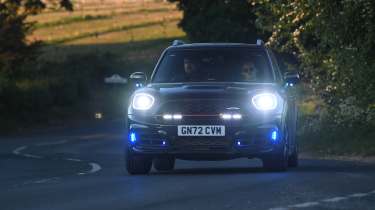
In a flash, the MINI’s blue lights were switched on and the chase began. At first, it appeared the car in question was refusing to stop, blasting off into the distance as we weaved through traffic. However, there was no losing Jones behind the wheel of the 302bhp John Cooper Works and we quickly caught up, with the Golf eventually pulling to the side of the road.
To our surprise it was a relatively young male that stepped out of the rather new car we’d just stopped – Jones explained that within the affluent area of Alderley Edge there were “plenty of young, well-off kids that immediately step into properly fast vehicles” – and he looked rather stunned at the fact that he had been pulled over by a police officer.
The fact that we pulled over a young male driving a car full of people is representative of how this demographic is, statistically, more likely to engage in anti-social and dangerous driving; in the year up to June 2024, males aged between 17 and 29 accounted for 18.5 per cent of all road-going casualties, despite this group making up just seven per cent of all licence holders.
After a chat with the offending driver and giving them a ticking off for driving without due care and attention, Jones joined us back in the car, explaining that young males, such as the one he’d just spoken to, can easily be goaded into performing dangerous manouvres by passengers.
“Social media 100 per cent plays a big role in anti-social driving nowadays,” Jones explained. “Kids are seeing people driving like idiots online and thinking that’s the norm. We, as well as social media companies, really need to nip it in the bud before it has a massive knock-on effect.”
Education is key
As such, rather than simply trying to scare the living daylights out of those breaking the rules, Jones says the best way to improve the quality of driving is to take opportunities such as this to give some advice.
“Education’s a big thing and there’s not enough out there. Once you get your ticket to drive, you’re left to your own devices,” Jones says. “It’s not really until they’re prosecuted that most people will receive any kind of further education. There’s always room to learn.”
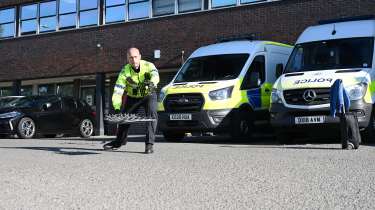
“If you just find someone and prosecute them, they're probably going to walk away with a dim view of the police and be reluctant to change their behaviour. But if you can point out that there are other ways and educate them as to what could have happened if something went wrong, then maybe they’ll question whether to do that sort of thing again.”
However, this kind of advice isn’t always well received; Jones says that sometimes the police can be viewed with hostility whenever they turn up at car meets to ensure drivers are acting safely and that everyone’s vehicles meet legal requirements.
“We often get feedback from people saying, ‘Aren’t you just wasting your time?’ and ‘Shouldn’t you be out catching murderers?’” Jones admits. “However, we’re looking at the bigger picture, making sure everyone’s cars are roadworthy and safe, because certain things can be a major contributing factor to something like an accident.”
Problem car meets
Just a couple of weeks prior to our ride, Cheshire police forced a local car club to cancel one of its events, following a huge car meet organised by another group, which saw dozens of instances of anti-social behaviour and even illegal street racing.
Essex Police defines illegal car meets as gatherings “where drivers meet on the public highway or large public car parks to race or show their vehicles to others.” However, James Smith is founder of TurboTribe – the group which had its event forcefully postponed – and told Auto Express: “There’s a big difference between drag racing through the tunnel at Manchester Airport and the slow-moving parade through a village that [they] had planned.”
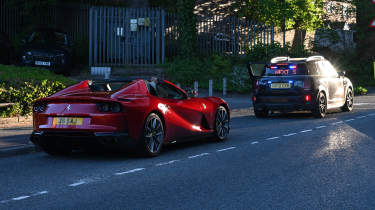
Having only founded the TurboTribe community in 2024, Smith says the group has a focus on being safe and family friendly, employing public liability insurance, as well as a team of marshals to ensure rules are being kept to.
“While we try to have a working relationship with the police, sometimes some individuals can be unfair,” Smith explained. “One of our partner brands was planning to host an event on their private land after receiving the landowner’s permission. However, two police officers turned up on their doorstep one morning and scared the life out of them. It seemed a bit coercive, saying the event isn’t good for the area – they were just clutching at straws.”
That’s not to say TurboTribe’s events are devoid of troublemakers; Smith says the group’s marshalls frequently instruct drivers to slow down if they are going too fast. Nevertheless, he was keen to point out how “the police talk a lot about responsibility and while it is up to the event organisers to make sure they’re doing everything they can, it's also on them to help bridge the gap and aid [them] to mitigate these risks.”
Police resources stretched
With this in mind, it seems the police have a delicate balancing act to perform. While enthusiasts should be allowed to indulge in their passions, anti-social driving is undoubtedly a big problem across the UK, with large numbers of people descending on certain areas and causing a great deal of distress to local communities.
PC Jones also explained that the repercussions of anti-social driving can be severe if anything goes wrong: “[it] varies wildly between minor injuries – cuts and bruises” he said, “to unfortunate incidents where people – not just those who are committing these acts, but the road users around them – can lose their lives.”
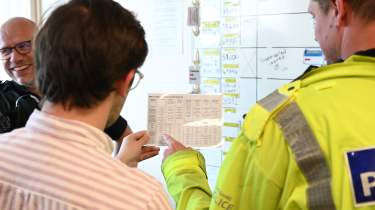
Such risks aren’t enough to dissuade everyone, though, and police forces are struggling to clamp down on anti-social driving. In fact, police insiders tell Auto Express that while Boris Johnson’s Conservative government did indeed deliver on its promise of 20,000 more police officers on UK streets, many forces were forced to freeze “civilian” hires, meaning police officers now are forced to spend a large portion of their shifts off the beat and doing paperwork.
“We need more police officers; we have fully paid officers doing things in the background such as admin,” Jones said, “This takes so much time – half of my shift is usually sitting in the office doing admin – and if we could get more people on the clerical side, that would make a massive difference to us on the front line.”
Even if the police do manage to catch offenders, Jones says the consequences of being prosecuted for dangerous driving have softened in the last couple of years. “Punishments seem to have come down a lot in recent times and I think the issue with overcrowded prisons doesn’t help,” he told us. “This is frustrating to see, because a lot of hard work goes into convicting someone; you constantly feel like you’re swimming against the tide.”
Ultimately, the cat-and-mouse game of police versus boy racers continues, but we’d be remiss as an automotive publication to not point out how car groups are trying to get people to enjoy their cars to the fullest somewhere legal and, most importantly, safer.
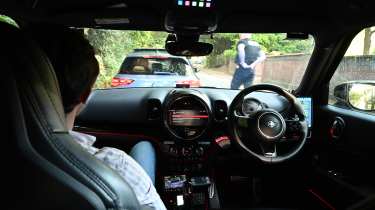
In association with Three Sisters Circuit, TurboTribe recently announced its new ‘Take it to the Track’ initiative, which aims to get drivers off the streets and onto the racetrack. Announcing the scheme, TurboTribe says its aims are to “offer an alternative to speeding on the highways, which will protect the public and foster a culture of respect, discipline and true driving passion.”
In the meantime, Smith was keen to put out a message to Cheshire Police, saying: “Please work with us – we’re happy to work with you and want to have you involved. You can come to events, bring squad cars, educate people on what they should and shouldn’t be doing. It’s the future of car enthusiasm, and the police are part of that story.”
Not every group has the same vision, however, and Jones wished to remind young drivers and enthusiasts that “It’s a privilege to have a licence, not a given. You need to treat it with more respect than most things in life, because that thing you’re driving can change a life in seconds.”
Did you know you can sell your car with Auto Express? Get the highest bid from our network of over 5,500 dealers and we'll do the rest. Click here to try Auto Express Sell My Car now...

